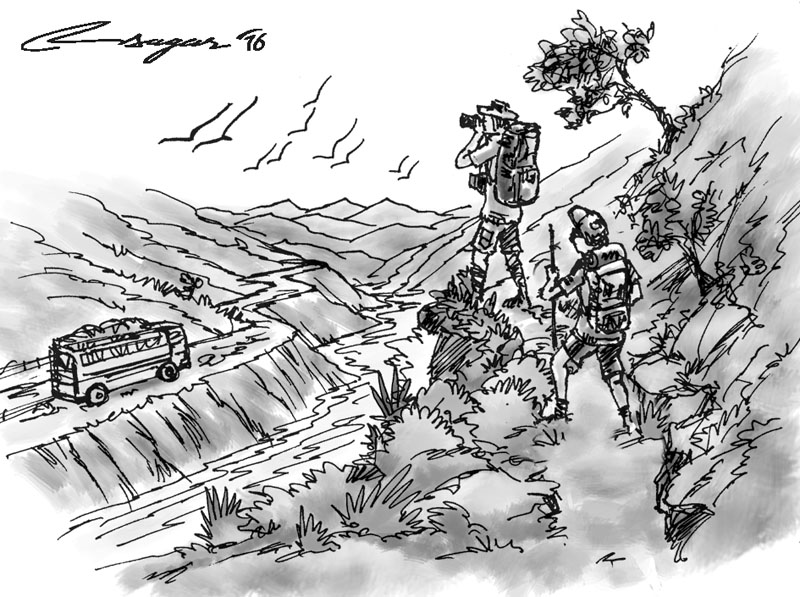Revival of tourism Concrete efforts required
Commitment from the government and concerned authority is a must but it is the responsibility of every single individual to understand and internalize the mantra ‘atithi devo bhaawa’ meaning guests are gods in Sanskrit
Nepal is a country of exceptional beauty. The flora and fauna here are extraordinary as the nature has been incredibly generous to it. The high rising chains of the Himalayas, the lakes that are stunning, the vast woodland housing mystical lives, the hills with magical herbs, the rivers flowing like it’s an enchanted dance performance, the lands are untouched by mankind. It’s like a celestial land. This land possesses immense treasure where natural aesthetic is pure, pleasant and peaceful.
Explaining Nepal in terms of its natural reserves obviously can make a normal person a dreamer or probably even a literati. But regrettably this is not its only face. Though the splendor of this country is unparalleled, there are rough sides that have been too harsh on it. To begin with, an obvious starter would be the prolonged political upheaval which has pushed the political course of the country into transition at different intervals since decades. This has left uncertainty in the formulation of policies and execution affecting every single aspect of the country, affecting development and ultimately leaving most of the countrymen poor. That’s why despite possessing this immense beauty, its protection and promotion remains lax. This small piece of heaven happens to be a dreamland for many.
In the latest series of events, the country’s tourism has been even hit hardest. The April 25 earthquake and its subsequent aftershocks continuing even till the date left a harsh impression on international tourists about Nepal. When it triggered mountain avalanches and landslides in the hills, tourism attraction was at its low. However, as global help poured in for the rescue and relief operation, word of mouth to support tourism in Nepal definitely did spread. But amid lack of policy and plans at government level, tourism did not recover significantly. Though the constitution had been long awaited, it came out hastily with seemingly less preparation for the aftermath it could invite. This immature move from the government’s side again triggered the already agitated Tarai igniting a spate of disapproval in the form of protests which took the worst form of border blockade adjoining India.
But amid such chaos also, there came a bright light after the National Geographic Traveler Magazine listed Nepal sixth as the world’s must-see destinations of 2016. In addition to this, another London based noted travel guide Rough Guides has also recommended Nepal as one of the top must-visit countries in 2016. These have brought huge hopes that the tourism could go up this year. Many fingers are crossed to see backpackers and trekkers walk through the trails of Langtang, go on a safari in the vast wilderness of Bandipur and Chitwan, glide over the skies of Pokhara, feel adrenalin rush bungy-jumping over Bhotekoshi, discovering the home stays at Syanja, Lamjung, Kaski and Rasuwa and many many more.
Though the National Geographic Travel magazine and the Rough Guides’ enlistment of Nepal as a preferred touristic location has widely left a positive impression upon international tourists, it again falls in the hands of our policy makers to cash on this opportunity to take up the country’s economy plunging under different forms of crisis. However, the incumbent Oli-led government which is obviously too busy in the hustle bustle of political parleys and political blame-games needs to give attention to tapping the potentials of tourism this year around. Sideline efforts towards giving the country an outlet from the ongoing deadlock are needed and there should also be efforts to strengthen the country’s biggest source of income.
In the current situation of scarcities and shortcomings, a sheer innovation from the tourism board’s side is expected to break the status quo. The then government constituted a national committee on revival of the country’s tourism in the month of July which was highly welcomed by the tourism sector as such a move was much needed at a time when the country’s tourism got shattered by the calamity. Owing to change in government and other political priorities, it has not been functioning as expected. From the government’s level, strong diplomatic efforts to boost the country’s tourism seems futile. As this is not a sole responsibility of government, the Nepali diaspora can equally mobilize their reach and influence in promoting Nepalese tourism.
Yes, there have been unprecedented upheavals in Nepal--naturally, politically and economically. But there also are hopes and ways to boost tourism. National solidarity is much needed to promote Nepal as an amazing tourism destination.
Commitment from the government and concerned authority is a must but it is the responsibility of every single individual to understand and internalize the mantra ‘atithi devo bhaawa’ meaning guests are gods in Sanskrit. Every individual must open welcoming arms to the visitors travelling Nepal. Showing generosity, love, respect and hospitality amid poverty and pain is rare and is beautiful. Tourism is the paramount way of keeping this country alive. Tourism should be our strength as it can take us to the crest of economic liberty and development. The year of 2016 hopefully paves the way for touristic boon in Nepal.
Pandey is former defence secretary






